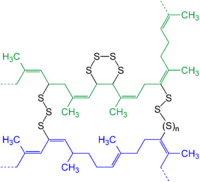
Photo from wikipedia
In the present study, we optimized the ultraviolet-A (UVA)/riboflavin crosslinking for the collagen-based artificial cornea for the first time to resolve the lack of donor cornea for corneal disease. We… Click to show full abstract
In the present study, we optimized the ultraviolet-A (UVA)/riboflavin crosslinking for the collagen-based artificial cornea for the first time to resolve the lack of donor cornea for corneal disease. We found that the crosslinking conditions, including irradiation time and irradiation intensity, played important roles on the property of the sample. At the optimal condition (with the irradiation time of 30 min and the irradiation intensity of 5 mW/cm2), the sample exhibited excellent crosslink degree and mechanical property while keeping good light transmittance. Meanwhile, the sample showed improved enzyme tolerance capacity and thermal stability. This developed artificial cornea also had good biocompatibility to human corneal epithelial cells in vitro. In vivo lamellar keratoplasty results showed that the developed sample could promote complete epithelialization in about 4 weeks, and the transparency is restored quickly in the first 6 weeks. Corneal rejection reaction and keratoconus are not observed. This optimized ultraviolet-A (UVA)/riboflavin crosslinking method would have great potential for collagen-based artificial cornea in clinic. © 2017 Wiley Periodicals, Inc. J. Appl. Polym. Sci. 2017, 134, 45226.
Journal Title: Journal of Applied Polymer Science
Year Published: 2017
Link to full text (if available)
Share on Social Media: Sign Up to like & get
recommendations!